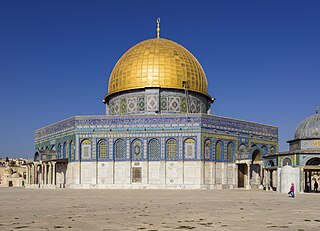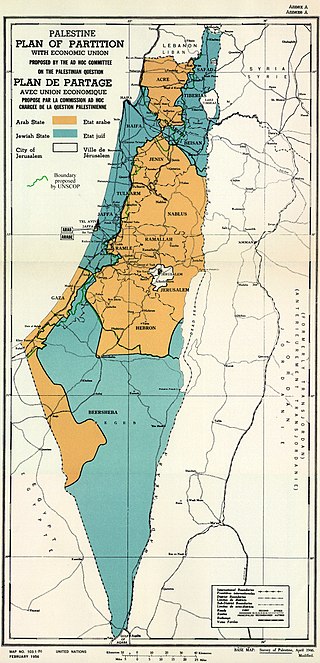
The history of the State of Palestine describes the creation and evolution of the State of Palestine in the West Bank and Gaza Strip.

The Palestinian territories are the two regions of the former British Mandate for Palestine that have been occupied by Israel since the Six-Day War of 1967, namely the West Bank and the Gaza Strip. The International Court of Justice (ICJ) has referred to the West Bank, including East Jerusalem, as "the Occupied Palestinian Territory", and this term was used as the legal definition by the ICJ in its advisory opinion of July 2004. The term occupied Palestinian territory was used by the United Nations and other international organizations between October 1999 and December 2012 to refer to areas controlled by the Palestinian National Authority, but from 2012, when Palestine was admitted as one of its non-member observer states, the United Nations started using exclusively the name State of Palestine. The European Union (EU) also uses the term "occupied Palestinian territory". The government of Israel and its supporters use the label "disputed territories" instead.

The United Nations Partition Plan for Palestine was a proposal by the United Nations, which recommended a partition of Mandatory Palestine at the end of the British Mandate. On 29 November 1947, the UN General Assembly adopted the Plan as Resolution 181 (II).
United Nations General Assembly Resolution 3379, adopted on 10 November 1975, "Determines that Zionism is a form of racism and racial discrimination" with 72 votes in favour, 35 votes against, and 32 abstentions. It was revoked by Resolution 46/86, adopted on 16 December 1991 with 111 votes in favour, 25 votes against, and 13 abstentions. The vote for Resolution 3379 was held nearly one year after the adoption of Resolution 3236 and Resolution 3237: the former recognized the "Question of Palestine" and invited the Palestine Liberation Organization (PLO) to participate in international diplomacy; and the latter designated the PLO as a non-member Assembly observer following the "Olive Branch Speech" by Palestinian political leader Yasser Arafat.
Issues relating to the State of Israel and aspects of the Arab–Israeli conflict and more recently the Iran–Israel conflict occupy repeated annual debate times, resolutions and resources at the United Nations. Since its founding in 1948, the United Nations Security Council, has adopted 79 resolutions directly related to the Arab–Israeli conflict as of January 2010.

The Committee on the Exercise of the Inalienable Rights of the Palestinian People (CEIRPP) is a committee mandated by the United Nations General Assembly in order to promote the rights of the Palestinian people, support the peace process and to mobilize assistance to the Palestinian people.
United Nations General Assembly Resolution 3236, adopted by the 29th Session of the General Assembly on November 22, 1974 recognizes the Palestinian people's right to self-determination, officializes United Nations contact with the Palestine Liberation Organization and added the "Question of Palestine" to the U.N. Agenda.
The International law bearing on issues of Arab–Israeli conflict, which became a major arena of regional and international tension since the birth of Israel in 1948, resulting in several disputes between a number of Arab countries and Israel.
The United Nations Division for Palestinian Rights (UNDPR) is a part of the Department of Political Affairs of the United Nations Secretariat.
Issues relating to the State of Palestine and aspects of the Israeli–Palestinian conflict occupy continuous debates, resolutions, and resources at the United Nations. Since its founding in 1948, the United Nations Security Council, as of January 2010, has adopted 79 resolutions directly related to the Arab–Israeli conflict.
The United Nations General Assembly Resolution 43/177 of 15 December 1988 was a resolution in which the United Nations General Assembly acknowledged the proclamation of the State of Palestine and the use of the designation "Palestine", referring to the PLO in the UN. Further, the Assembly affirmed the need for sovereignty by the Palestinian people over their territory occupied in 1967 by Israel. The resolution is titled "43/177. Question of Palestine".
The United Nations General Assembly Resolution 43/176 of 15 December 1988 was a resolution in which the General Assembly called for the convening of an International Peace Conference on the Middle East, under the auspices of the United Nations. The resolution is titled "43/176. Question of Palestine". The peace conference was proposed in the framework of international politics.
The United Nations General Assembly Resolution 58/292 of 6 May 2004 was a resolution in which the United Nations General Assembly affirmed that the status of the Palestinian territory occupied since 1967, including East Jerusalem, remains one of military occupation, and that Israel has only the duties and obligations of an occupying Power under the Geneva Convention relative to the Protection of Civilian Persons and the Hague Convention.
United Nations General Assembly resolution 67/19 is a resolution upgrading Palestine to non-member observer state status in the United Nations General Assembly. It was adopted by the sixty-seventh session of the United Nations General Assembly on 29 November 2012, the date of the International Day of Solidarity with the Palestinian People and the 65th anniversary of the adoption by the General Assembly of resolution 181(II) on the Future Government of Palestine. The draft resolution was proposed by Palestine's representative at the United Nations. It, however, maintains the status of the Palestinian Liberation Organization as the representative of the Palestinian people within the United Nations system. Though strongly contested by the United States and the government of Israel, former Israeli Prime Minister Ehud Olmert expressed support for the measure. The motion was seen as largely symbolic, though it could allow Palestine to start proceedings at the International Criminal Court against Israel. Its timing, following a year in which Palestine obtained membership of UNESCO and the UN Security Council was unable "to make a unanimous recommendation" on their application for full UN membership, and coming several days after the completion of Operation Pillar of Defense, was also noted. The new status equates Palestine with that of the Holy See within the United Nations system and implicitly recognises Palestinian sovereignty.
The Palestinian Declaration of Independence formally established the State of Palestine, and was written by Palestinian poet Mahmoud Darwish and proclaimed by Yasser Arafat on 15 November 1988 in Algiers, Algeria. It had previously been adopted by the Palestinian National Council (PNC), the legislative body of the Palestine Liberation Organization (PLO), by a vote of 253 in favour, 46 against, and 10 abstaining. It was read at the closing session of the 19th PNC to a standing ovation. Upon completing the reading of the declaration, Arafat, as Chairman of the PLO, assumed the title of President of Palestine. In April 1989, the PLO Central Council elected Arafat as the first President of the State of Palestine.
There are a wide variety of views regarding the legal status of the State of Palestine, both among the states of the international community and among legal scholars. The existence of a state of Palestine, although controversial, is a reality in the opinions of the states that have established bilateral diplomatic relations. It is a non-member observer state at the United Nations since November 2012. As of 2 June 2023, a total of 139 countries recognize it.
The Origins and Evolution of the Palestine Problem is a study prepared by the United Nations Division for Palestinian Rights under the guidance of the Committee on the Exercise of the Inalienable Rights of the Palestinian People, as proposed on 2 December 1977 by General Assembly resolution 32/40.

Palestine–Ukraine relations are bilateral relations between the State of Palestine and Ukraine. The Ukrainian Soviet Socialist Republic recognized Palestinian independence on 19 November 1988. Palestine recognized Ukraine as a sovereign state in February 1992. On 2 November 2001, the two countries established diplomatic relations and the Palestinian embassy opened the same day. Ukraine has supported UN resolutions against Israel's occupation of the Palestinian territories.





